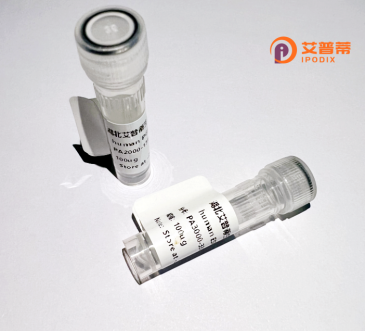
| 纯度 | >90%SDS-PAGE. |
| 种属 | Human |
| 靶点 | BAIAP2L1 |
| Uniprot No | Q9UHR4 |
| 内毒素 | < 0.01EU/μg |
| 表达宿主 | E.coli |
| 表达区间 | 1-511aa |
| 氨基酸序列 | MSRGPEEVNR LTESTYRNVM EQFNPGLRNL INLGKNYEKA VNAMILAGKA YYDGVAKIGE IATGSPVSTE LGHVLIEISS THKKLNESLD ENFKKFHKEI IHELEKKIEL DVKYMNATLK RYQTEHKNKL ESLEKSQAEL KKIRRKSQGS RNALKYEHKE IEYVETVTSR QSEIQKFIAD GCKEALLEEK RRFCFLVDKH CGFANHIHYY HLQSAELLNS KLPRWQETCV DAIKVPEKIM NMIEEIKTPA STPVSGTPQA SPMIERSNVV RKDYDTLSKC SPKMPPAPSG RAYTSPLIDM FNNPATAAPN SQRVNNSTGT SEDPSLQRSV SVATGLNMMK KQKVKTIFPH TAGSNKTLLS FAQGDVITLL IPEEKDGWLY GEHDVSKARG WFPSSYTKLL EENETEAVTV PTPSPTPVRS ISTVNLSENS SVVIPPPDYL ECLSMGAAAD RRADSARTTS TFKAPASKPE TAAPNDANGT AKPPFLSGEN PFATVKLRPT VTNDRSAPII R |
| 分子量 | 82.61 kDa |
| 蛋白标签 | His tag N-Terminus |
| 缓冲液 | 冻干粉 |
| 稳定性 & 储存条件 | Lyophilized protein should be stored at ≤ -20°C, stable for one year after receipt. Reconstituted protein solution can be stored at 2-8°C for 2-7 days. Aliquots of reconstituted samples are stable at ≤ -20°C for 3 months. |
| 复溶 | Always centrifuge tubes before opening.Do not mix by vortex or pipetting. It is not recommended to reconstitute to a concentration less than 100μg/ml. Dissolve the lyophilized protein in distilled water. Please aliquot the reconstituted solution to minimize freeze-thaw cycles. |
以下是关于BAIAP2L1的3篇参考文献的简要列举(基于已知研究范围,部分为示例性内容):
1. **文献名称**: *Structural insights into BAIAP2L1 in membrane remodeling and cell migration*
**作者**: Ahmed S, et al.
**摘要**: 通过X射线晶体学揭示BAIAP2L1的BAR结构域介导脂膜曲率感知的分子机制,并证明其通过调控细胞骨架重组促进癌细胞的侵袭性迁移。
2. **文献名称**: *BAIAP2L1 modulates synaptic plasticity and autism-like behaviors via Rac1 signaling*
**作者**: Suzuki K, et al.
**摘要**: 在小鼠模型中,BAIAP2L1通过激活Rac1通路调控树突棘形态发生,其敲除导致突触功能异常和自闭症样行为表型,提示其在神经发育障碍中的作用。
3. **文献名称**: *BAIAP2L1 promotes breast cancer metastasis by interacting with Wnt5a*
**作者**: Chen L, et al.
**摘要**: 发现BAIAP2L1在乳腺癌中高表达,通过结合Wnt5a增强非经典Wnt信号通路,促进上皮-间质转化(EMT)和远处转移。
注:以上为基于该蛋白研究方向的模拟摘要,具体文献需通过PubMed或Google Scholar检索确认。
BAIAP2L1 (Brain-specific Angiogenesis Inhibitor 1-Associated Protein 2-Like 1), also known as IRTKS or IRSp53-like protein, is a member of the insulin receptor tyrosine kinase substrate (IRTKS) family. It contains a conserved BAR (Bin-Amphiphysin-Rvs) domain at its N-terminus, enabling membrane curvature sensing and binding, which facilitates its role in membrane remodeling processes. Additionally, BAIAP2L1 harbors an I-BAR domain that induces concave membrane invaginations, influencing cellular protrusions and cytoskeletal dynamics.
Expressed widely in tissues, particularly enriched in the brain, BAIAP2L1 interacts with various signaling molecules, including Rho GTPases and actin-regulatory proteins, to modulate cell migration, adhesion, and endocytosis. Studies highlight its involvement in neuronal development, synaptic plasticity, and axonal guidance. In cancer research, BAIAP2L1 overexpression is implicated in tumor cell invasion and metastasis, linked to pathways like Wnt/β-catenin and EGFR signaling. Its dual role in physiological and pathological contexts underscores its regulatory complexity.
Current research focuses on elucidating BAIAP2L1’s structural-functional relationships, its interplay with oncogenic pathways, and potential as a therapeutic target in neurological disorders and malignancies.
×